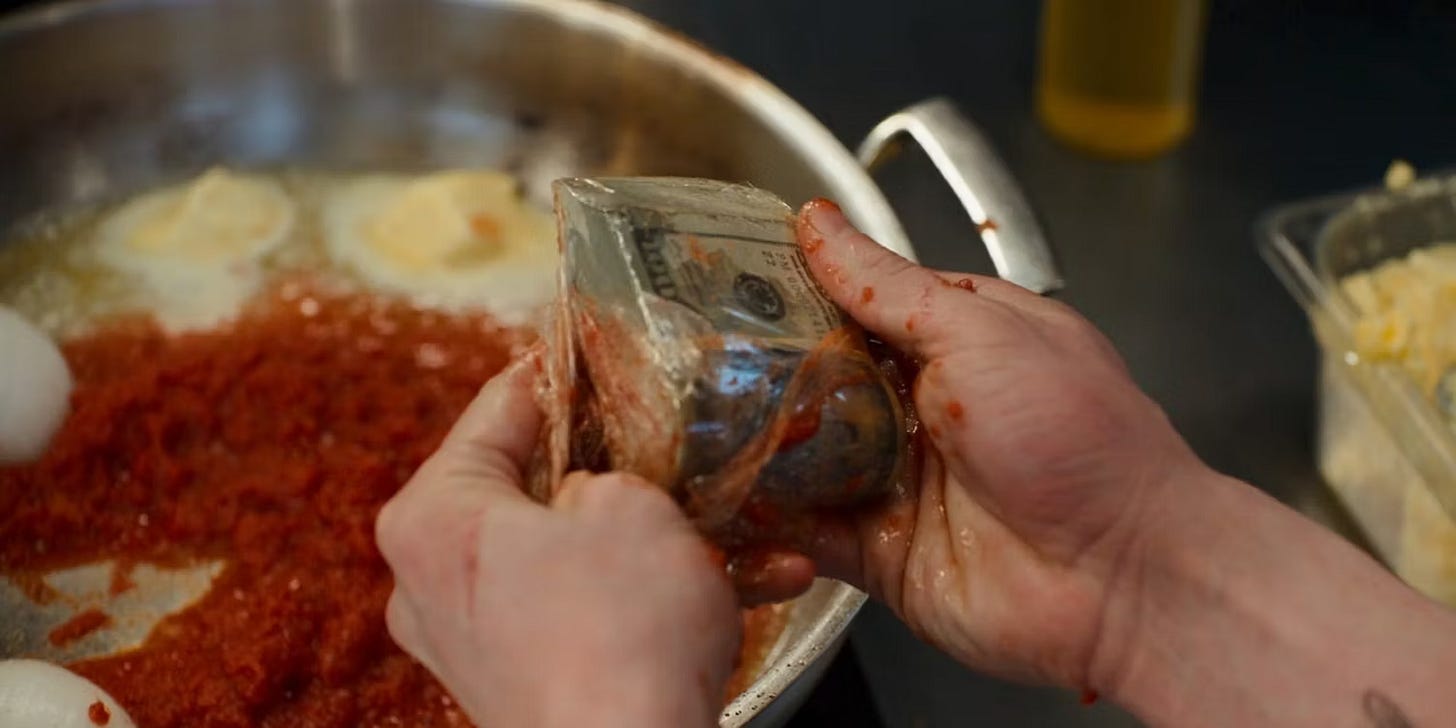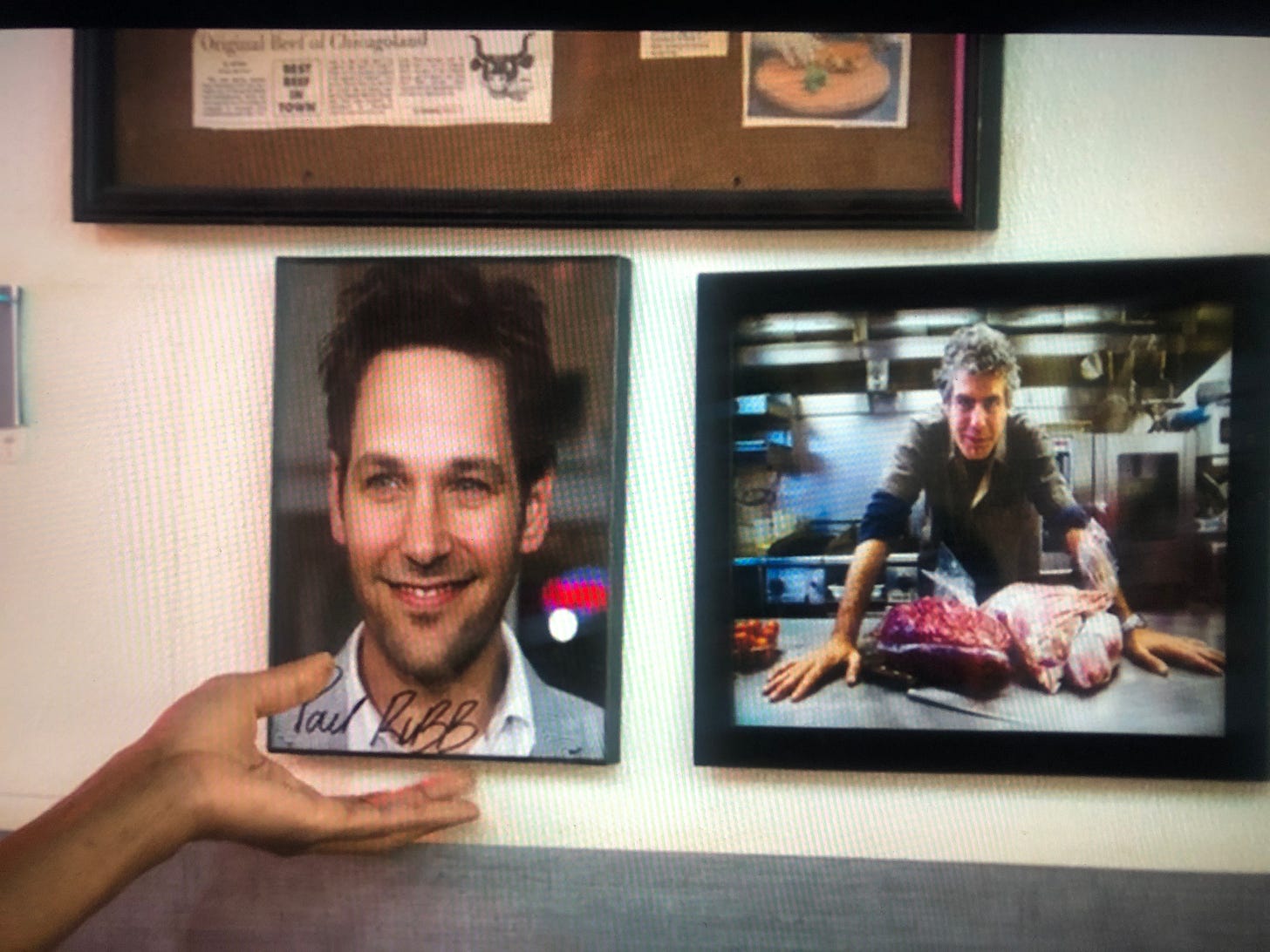The Bear Offers Inner-Child Healing for the Entrepreneurial Spirit, Foodies, and Delicate Neighbourhood Ecosystems.
FX's award-winning show brings a heartwarming tale of healing family trauma and unhealthy ambition through trust and friendship, one beef sandwich at a time.
Insights on The Bear Pt. 1
In the spirit of wanting to write more insights on storytelling in television, film, novels and pop culture from time to time on my sire, I am diving into what I love about the narrative development between the end of Season 1 and into Season 2 of FX’s The Bear.
TW: mentions of suicide, addiction and death in this article
Some spoilers ahead but I recommend the show highly.
The Seven Minute Monologue
“You know, like, like, I’m gonna go work in real kitchens.
Like, f*ck Mom and Dad’s piece of shit, right?
And it sounds ridiculous, you know, me saying that now, but that’s-that’s-that’s what I did.
And I got the shit kicked outta me.
And I separated herbs and I shucked oysters and clams and uni.
And I cut myself, and I got garlic and onions and peppers in my fingernails and in my eyes, and my skin was dry and oily at the same time.
I had calluses on my fingers from the knives, and my stomach was f*ckеd, and it was… everything.”
Season one ends off with a self-conscious yet preternaturally skilled chef Carmen Berzatto (aka Carmy) reflecting on his brother’s death (Michael was an addict who ended up taking his life) which leaves him in charge of the restaurant he left behind to him and his sister Natalie “Sugar” Berzatto. He calls himself a “cook” here despite introducing the term “chef” to the Original Beef workers as a term of respect that he uses.
This scene that paints the show’s usually blunt, headstrong, sometimes brooding lead personality Carmen (played by Emmy winner Jeremy Allen White) finally vulnerable and dealing with his grief. This scene was brilliant and it was hard to believe how long it was upon rewatching it, it felt like only 3 minutes, note the poetic tone, the dialogue seems written to reel you in with the vowel-rhymes (me/uni, eyes/dry/time).
Good Evening, Chef
At first, we know close to nothing about the struggling sandwich shop (Original Beef of Chicagoland) before Head Chef Carmen, brother of Michael Berzatto, and new hire and Chef de Cuisine Sydney reimagine and begin renovation on the business. We find out that Michael never let Carmy work at the restaurant, hid his addiction from him, which pushed Carm to train harder as a chef at school, become an awarded chef in his own right and therefore straining the relationship right up to Mikey’s death; the need for recognition was strong, and goes back to his childhood with Mikey.
Michael, who had back taxes with the IRS, didn’t make sure cousin Richie (the manager) got food certified, mounted insane debt and once punched a hole in the wall of the office space while on drugs and weighed the possibility of burning the restaurant down for the insurance money, was also a brilliant chef, who ironically had enough sense to leave bundles of money that were given by family friend “Uncle Jimmy” hidden in tomato cans to be used by Carmy for the new restaurant he thought up back in high school. He passes on a kitchen family spaghetti recipe to get Carmen to find the stash. Pasta sauce hiding money is quite an inheritance to receive!
Season 2 makes early references the late great Anthony Bourdain -- who I was introduced to through his series Parts Unknown and it is said that the show is based on Kitchen Confidential. -- is a touching nod to a famous figure in American cuisine, and to Bourdain’s passion for food and how he contributed to the culture. Mikey himself seems to mirror Anthony as the series subtly engages in meta-discourse on the world of cuisine and mental health, framing the show around the stresses and pressures of the industry, the creativity and passion it entails and the tragedies that occur. Season two also has plenty of meta-narratives of the show’s out-of-the-blue success with all the celebrity guest appearances.
From the minute Carmen sells Michael’s Original Selvedge jeans and a pair of 1955 blanket-lined Type 3 pleated jeans plus a bag of coins for a good cut of Superior Angus beef in the first episode, I was hooked on the Berzatto family charm, and mystique (like keeping track of real cousins vs family friend cousins), and the way they pass down behaviours and traditions. The younger brother being left with the denim hand-me downs and trading them for meat is a sadly poetic nod to the way family legacies stay with us and maybe how we can even bargain with them.
Items that connect us to our memories and personal lives can be used to build anew when releasing them, or when we need closure. Carmy gave up famous high-end chef life for family duty, he trades jeans for ingredients, and why store them in the oven and not on a shelf? Were there that many jeans? The kitchen vs the home, how kitchen life intrudes into the home.
Carmy’s one-sided feud with his brother for Top Chef was only ever going to end with Michael leaving the business to his talented younger brother. This fact puts Carmy in group therapy (to his sister’s delight) and opening audiences up to Carmy’s motivations, lifting the veneer of his ever-distracted, intense demeanour and working-class male stoicism. Cheers to healing inner-child and brother issues!
The devices the show writers use to craft a story full of nostalgia, family themes, and entrepreneurship are not only apt but also humorous, because why on earth would a famous Michelin star awarded, chef like Carmen keep jeans in the oven?
Same reason one opens a risky business like a restaurant, because they can.
The characters all share a long history with the Original Beef, as Carmy reads Syd’s resume seemingly impressed that she graduated CIA and asks why she would be applying for the job of sous chef at a rundown spot like their’s the answer is sentimental: Syd’s father would eat there on Sundays.
A flashback of the Berzattos cooking pizza together (S1ep6) where Michael is retelling a story of running into drunk high school buddies at a bar called Ceres that opened at 6:30am because it is located in a trade building, a story Richie’s date was unimpressed by, is a way heartfelt memories and grief are tied directly to our hearts. As much as Cousin Richie’s character is written to be annoying with his circular retelling of tales from his youth in Chicago as the staff hustles to prepare for the day, he shows how food, business and community are intertwined.
Richie has been concerned about the neighbourhood changing, what he has called since Season one the “delicate ecosystem” of the restaurants and bars in the city, built from a shared history, love and respect. Tina gets teary-eyed when crying to Richie about loving Michael but also loving the changes the new owners are bringing. As much as he gives off a “peaked in high school”, “oldhead” and Peter-Panesque personality, he introduces a central idea in the bear:
who are we and what do we offer in the face of a change in direction? In the face of ambition what does that fear of success or failure trigger in us?
A Fabric of Family, Friendship, Trust and Memory
Carmy is evidently affected by his past and it affects his relationship with cooking, even so much as having flashbacks to chefs verbally abusing him about his flaws and (perceived) inadequacies while staging a plate. This reminded me of a recent interview of Gordon Ramsay with Josh Scherer discusses how the abuse in the kitchen under various chefs was different than Ramsay’s father’s abuse of his mother and siblings growing up: the training to be a great chef gave the emotional toll of restaurant life a purpose whereas being his father’s son and subjected to his violence didn’t have a clear purpose.1
Widely held cultural beliefs link art to madness, rage, emotional volatility and even unbridled ambition. Ramsay reflects on not running kitchens the same way as he used to but that he was doing what he knew, which mirrors Carmy’s season 1 meltdown resulting in Marcus and Syd walking out due to his aggressive behaviour. Carmy inherits toxic ambition, hellish kitchen behaviour, and his memories and regrets. After (somewhat?) apologizing for his conduct, he becomes a trusted mentor and equal business partner for passionate and ambitious Syd who needs to convince her dad that her chef dream will take off. In return she takes Carmy’s quirks in stride when first visiting his apartment to plan meals (S2ep2), jeans in the oven? No problem. The more wholesome scenes serve to balance out the verbal abuse stories that we usually get about the restaurant industry.
On Syd’s food tour across Chicago (the foodie in me loved S2ep3 for this reason) to get a taste of the current restaurant business she is reminded that it is important to have a strong partner you can trust to open a business with. The Bear’s kitchen crew behave like an actual family, and a community that moves beyond the wounds of their pasts to achieve a staple in their Chicago neighbourhood.
More on Season Two in Pt 2…
Mythical Kitchen, Jan 9 2024 ‘Gordon Ramsey Eats his Last Meal’





